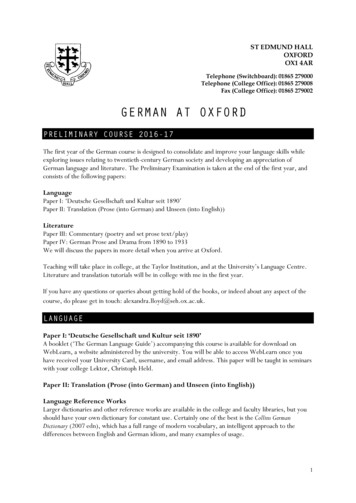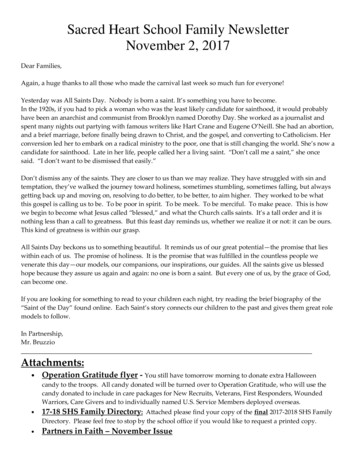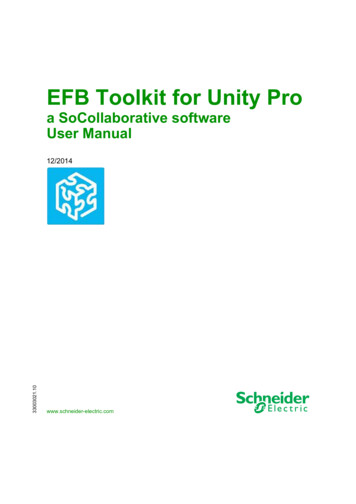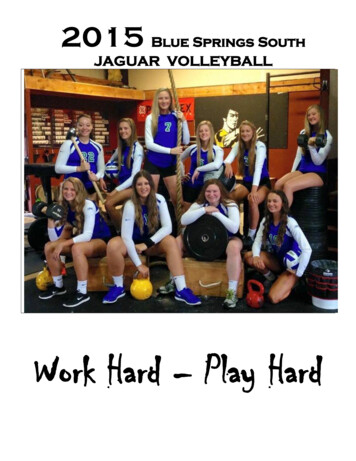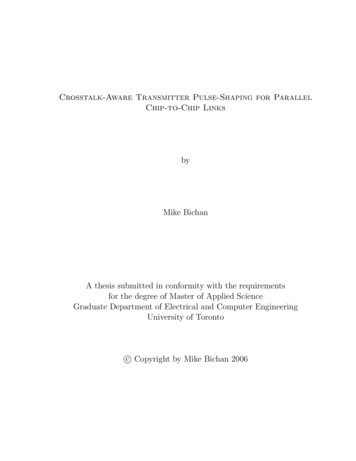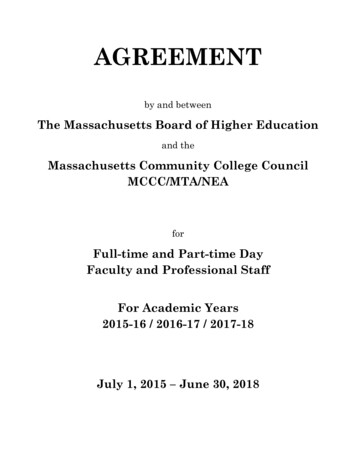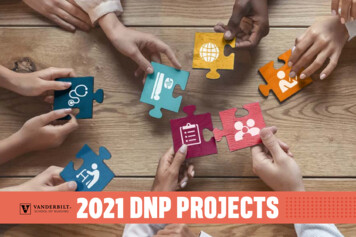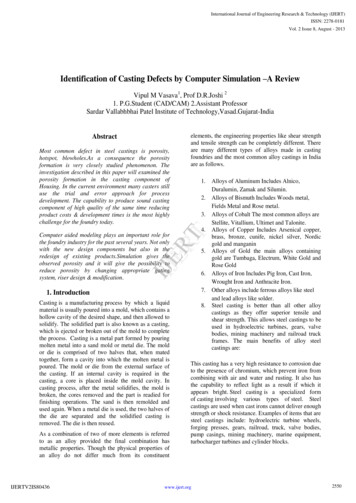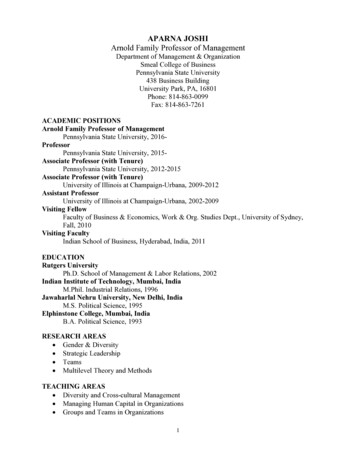
Transcription
APARNA JOSHIArnold Family Professor of ManagementDepartment of Management & OrganizationSmeal College of BusinessPennsylvania State University438 Business BuildingUniversity Park, PA, 16801Phone: 814-863-0099Fax: 814-863-7261ACADEMIC POSITIONSArnold Family Professor of ManagementPennsylvania State University, 2016ProfessorPennsylvania State University, 2015Associate Professor (with Tenure)Pennsylvania State University, 2012-2015Associate Professor (with Tenure)University of Illinois at Champaign-Urbana, 2009-2012Assistant ProfessorUniversity of Illinois at Champaign-Urbana, 2002-2009Visiting FellowFaculty of Business & Economics, Work & Org. Studies Dept., University of Sydney,Fall, 2010Visiting FacultyIndian School of Business, Hyderabad, India, 2011EDUCATIONRutgers UniversityPh.D. School of Management & Labor Relations, 2002Indian Institute of Technology, Mumbai, IndiaM.Phil. Industrial Relations, 1996Jawaharlal Nehru University, New Delhi, IndiaM.S. Political Science, 1995Elphinstone College, Mumbai, IndiaB.A. Political Science, 1993RESEARCH AREAS Gender & Diversity Strategic Leadership Teams Multilevel Theory and MethodsTEACHING AREAS Diversity and Cross-cultural Management Managing Human Capital in Organizations Groups and Teams in Organizations1
EDITORIAL POSITIONS/BOARDS/PROFESSIONAL SERVICEBoard of Governors, Representative-at-large, Academy of Management, 2016-2019.Guest Editor, Special Issue on Diversity at a Critical Juncture, Academy of ManagementReview, 2017Associate Editor, Academy of Management Journal, 2013-2016Editorial Board, Academy of Management Journal, 2010-2013Editorial Board, Organizational Behavior and Human Decision Processes, 2010-2013Co-Editor, Research in Personnel and Human Resource Management, 2009-2013HONORS /AWARDS/GRANTS2014The Cummings Award for Early- to Mid-career Scholarly Achievement,Organizational Behavior Division of the Academy of Management.2010National Science Foundation (NSF) Grant #0964963 281,835.00Joshi, A. Unpacking the Effects of Demographic Diversity in MultidisciplinaryGroups (sole PI), Innovations and Organizational Sciences Program, Division ofSocial and Economic Sciences2010 Saroj Parasuraman Award for Best Published Paper in the Area of Diversity,Academy of Management Meeting, Montreal, Canada.Joshi, A., & Roh, H. 2009. The role of context in work team diversity research: Ameta-analytic review. Academy of Management Journal. 52: 599-628.2008 Dorothy Harlow Distinguished Paper Award, Academy of ManagementMeeting, Anaheim, CA.Joshi A., & Roh., H. 2008. Considering context in work team diversity research:A meta-analytic review.2007 OB Division’s Making Connections Award, Annual Academy of ManagementMeeting, Philadelphia, PA. Joshi A. 2007. How, where, and why diversitymatters: A contextualized agenda for future research. Chair, organizer andpresenter of panel symposium.2006 Dorothy Harlow Distinguished Paper Award, Academy of ManagementMeeting, Atlanta.Liao, H., Chuang, A., & Joshi, A. 2006. In the eye of the beholder:Understanding perceived dissimilarity.2001 Gender and Diversity in Organization's Best Paper Based on a DissertationAward, Academy of Management.Joshi, A. 2001. The context in which some differences make a difference: Theinfluence of organizational demography on the outcomes of team diversity.2
PUBLICATIONSRefereed Journal Articles1. Joshi, A., Hambrick, D., & Kang J*. 2020. The generativity mindsets of Chief ExecutiveOfficers: A new perspective on succession outcomes, Academy of Management Review,In Press2. Johnson, T., Joshi, A., & Hogan, T. 2020. On the front lines of disclosure: A conceptualframework of stigma disclosure events, Organizational Psychology Review, In Press.3. Dwivedi*, P., Joshi, A. & Misangyi V.F. 2018. Gender-inclusive gate-keeping: How(mostly) male predecessors can influence the success of female CEOs. Academy ofManagement Journal. 61(2), 379-404.4. Briscoe, F., & Joshi, A. 2017. Bringing the boss’s politics in: Supervisor politicalideology and the gender gap in earnings. Academy of Management Journal, In Press.5. Johnson*, J., & Joshi, A. 2016. Dark clouds or silver linings? A stigma threat perspectiveon the implications of an autism diagnosis for workplace well-being. Journal of AppliedPsychology. 101(3):430-449.6. Joshi, A., Son*, J., & Roh, H. 2015. When can women close the gap? A meta-analytictest of sex differences in performance and rewards. Academy of Management Journal.58(5):1516-1545.7. Joshi A., & Knight A. 2015. Who defers to whom and why? Dual mechanisms linkingdemographic differences to dyadic deference and team effectiveness. Academy ofManagement Journal. 58: 59-84.8. Joshi A. 2014. By whom and when is women’s expertise recognized? The interactiveeffects of gender and education in science and engineering teams. Administrative ScienceQuarterly. 59: 202-2399. Gajendran, R., & Joshi, A. 2012. Innovation in globally distributed teams: The role ofLMX, communication frequency, and member influence on team decisions. Journal ofApplied Psychology, 97:1252-126110. Joshi, A., Liao, H., & Roh, H*. 2011. Bridging domains in workplace demographyresearch: A review and reconceptualization. Journal of Management. 37: 521-552.Special Issue on Bridging Micro and Macro Domains in Organizational Research11. Joshi, A., Dencker, J., Franz, G.*, & Martocchio. J. 2010. Unpacking generationalidentities in organizations. Academy of Management Review. Vol. 35, 392-414.Runner up for the Saroj Parusaraman Award, Best Published Paper in the area of Diversity,GDO Division*3Student co-authors at the time of submission
12. Joshi, A., Pandey, N.*, & Han G.* 2009. Bracketing team boundary spanning: Anexamination of task-based, team-level, and contextual moderators. Journal ofOrganizational Behavior. 30: 731-759.Runner Up 2009 Best Paper in Journal of Organizational Behavior13. Joshi, A., & Roh**, H. 2009. The role of context in work team diversity research: Ameta-analytic review. Academy of Management Journal. 52: 599-628.14. Joshi, A., Lazarova, M., & Liao, H. 2009. Getting everyone on board: The role ofinspirational leadership in geographically dispersed teams. Organization Science. 20:240-252.15. Liao, H., Chuang A., & Joshi A. 2008. Perceived deep level dissimilarity: Personalityantecedents and impact on overall job attitudes, helping, work withdrawal and turnover.Organizational Behavior and Human Decision Processes. 106:106-124.16. Dencker, J., Joshi, A., & Martocchio, J. 2008. Towards a theoretical framework linkinggenerational memories to workplace attitudes and behaviors. Human ResourceManagement Review. 18: 210-220.17. Dencker, J., Joshi, A., & Martocchio, J. 2007. Employee benefits as a source of intergenerational conflict. Human Resource Management Review. 17:208-220.18. Joshi, A. 2006. The influence of organizational demography on the external networkingbehavior of teams. Academy of Management Review. 31: 583-597.19. Joshi, A., Liao, H., & Jackson, S.E. 2006. Cross-level effects of workplace diversity onsales performance and pay. Academy of Management Journal, 49: 459-481.20. Liao, H., Joshi A., & Chuang, A. 2004. Sticking out like a sore thumb: Employeedissimilarity and deviance. Personnel Psychology. 57: 969-1000.21. Jackson, S.E. & Joshi A. 2004. Diversity in social context: A multi-attribute, multi-levelanalysis of team diversity and performance in a sales organization. Journal ofOrganizational Behavior, 25: 675-702.22. Leonard, J., Levine, D., & Joshi A. 2004. Do birds of a feather shop together? Theeffects on performance of employees’ similarity with one another and with customers.Journal of Organizational Behavior, 25:731-754.23. Jackson, S. E., Joshi, A., & Erhardt, N. L. 2003. Recent research on team andorganizational diversity: SWOT analysis and implications. Journal of Management. 29:801-830.Cited among the top 25 most highly read papers in the Journal of Management*4Student co-authors
24. Kochan, T., Bezrukova, K., Ely, R., Jackson, S., Joshi, A., Jehn, K., Leonard, J., Levine,D., and Thomas, D. 2003. The effects of diversity on business performance: Report of afeasibility study of the diversity research network. Human Resource ManagementJournal, 42: 3-21.25. Gully, S., Incalcaterra, K., Joshi, A., & Beaubin, J. 2002. A meta-analysis of teamefficacy, potency, and performance: Interdependence and level of analysis as moderatorsof observed relationships. Journal of Applied Psychology, 87: 819-832.26. Joshi, A., Labianca, G., & Caligiuri P. 2002. Getting along long distance: Understandingconflict in a multinational team through social network analysis. Journal of WorldBusiness. 37:277-28427. Caligiuri, P.M., Joshi, A., & Lazarova M. 1999. Factors affecting the success of womenon global assignments. International Journal of Human Resource Management, 10:163-179.28. Caligiuri, P., Hyland, M., Joshi A., & Bross, A. 1998. Testing a theoretical model forexamining the relationship between family adjustment and expatriates’ work adjustment.Journal of Applied Psychology, 83: 598-614.Editorials, Book Chapters, Other Publications29. Nkomo, S. M., Bell, M. P., Roberts, L. M., Joshi, A., & Thatcher, S. M. 2019. Diversityat a critical juncture: New theories for a complex phenomenon. Academy ofManagement Review, Introduction to Special Topics Forum 44(3), 498-517.30. Kreiner, G. E., & Joshi, A. The Liminal Researcher: Being Not Quite the Center ofAttention. Academy of Management Perspectives, (ja).31. Joshi. A. & Neely*, B. A Structural-Emergence Model of Team Diversity. In the AnnualReview of Organizational Psychology and Organizational Behavior vol. 5.32. Kreiner, G.E., Bishop, D.G. & Joshi. A. “Seeing the light” or “blinded by the light”?Journeys of positivist scholars into qualitative inquiry. To appear in Mir, R. & Jain, S.(Eds.), The Routledge Handbook of Qualitative Research, Routledge.33. Joshi, A. Neely*, B, Emrich, C., Griffiths, D., & George, G. 2015. Gender Research inAMJ: AN Overview of Five Decades of Empirical Research and Calls to Action.Academy of Management Journal, 58(5), 1459-1475.34. Joshi, A., & Roh., H. Context in Work Team Diversity Research. In Roberson, Q. (Ed)Oxford Handbook of Diversity, Oxford University Press. Forthcoming.35. Joshi, A., Dencker, J., & Franz, G. 2011 Generations in organizations. In Brief A. &Staw, B (Eds) Research in Organizational Behavior. 3:177-2055
36. Jackson S.E & Joshi, A. 2011. Work team diversity. In S.Zedeck (Ed.) APA Handbookof IO Psychology (Vol. 1: Building and developing the organization: 651-686). APA:Washington DC, US.37. Joshi, A., & Roh, H. 2008. A contextual examination of work team diversity research: Areview and future agenda. In E. Mannix and M. Neale (Eds.) Research on ManagingGroups and Teams. (Vol. 11: 27-53). Emerald Publishing:UK.38. Joshi, A., & Roh, H. 2007. Context matters: Multilevel considerations in diversityresearch. In J. Martocchio (Ed) Research in Personnel and Human ResourceManagement. (Vol. 26: 1-48). Elsevier, JAI: Oxford.39. Joshi, A., & Lazarova, M. B. 2006. Do “global” teams need “global” leaders?:Identifying leadership competencies in multinational teams. In D. L. Shapiro, M.A. VonGlinow, and J. Cheng (Eds.), Managing Multinational Teams: Cultural,Organizational, and National Influences. Elsevier Press.40. Joshi, A., & Martocchio, J.J. Compensation and reward systems in a multiculturalcontext. In Eugene Stone and Ed Salas (Eds.) Cultural Diversity and Human ResourcesPractices. Lawrence Erlbaum. Forthcoming.41. Joshi, A. & Jackson S. E. 2003. Understanding work team diversity: Challenges andopportunities. In M. West, D.Tjosvold and K.Smith, (Eds.) The International Handbookof Organizational Teamwork and Cooperative Working (pg. 277-296). John Wiley &Sons Ltd.42. Jackson, S.E., & Joshi A. 2001. Research on domestic and international diversity inorganizations: A merger that works? In N. Anderson, D. Ones, H. Sinangil, & C.Visweswaran, (Eds.) Handbook of Industrial, Work and Organizational Psychology(pg. 206-231). Sage Publications.43. Joshi, A. 1999. Networking employees for success in global teams: A case study.International Journal of Human Resource Information Management, December,1999:34-39.44. Caligiuri, P., Hyland, M., & Joshi A. 1998. Families on global assignments: Applyingwork family theories abroad. In A. Rahim (Ed.) Current Topics in Management (Vol.3):313-328. Greenwich, CT: JAI Press.Best Paper Proceedings45. Joshi A., & Knight A. 2014. Who defers to whom and why? The effects of demographicdifferences and dyadic deference on team effectiveness. OB Division, Best PaperProceedings, Academy of Management Meetings, Philadelphia.46. Son, J., Joshi, A., & Roh, H. 2012. The Contingent Effects of Gender on Performanceand Turnover, GDO Division, Best Paper Proceedings Academy of ManagementMeetings, Boston.6
47. Gajendran, R., & Joshi, A. 2011. Inclusion and Identification in Virtual Teams: DoesLeader-Member Virtual Communication Matter? OCIS Division, Best PaperProceedings, Academy of Management Meetings. San Antonio, Texas.48. Joshi A., & Roh., H. 2008. Considering context in work team diversity research: Ameta-analytic review. GDO Division, Best Paper Proceedings, Academy ofManagement Meetings. Anaheim, CA.49. Joshi, A., Lazarova, M., & Liao, H. 2006. A Cross-level study of identification ingeographically dispersed settings: The role of leadership. OB Division, Best PaperProceedings, Academy of Management Meetings. Atlanta, GA.50. Liao, H., Chuang, A., & Joshi, A. 2006. In the eye of the beholder: Understandingperceived dissimilarity. GDO Division, Best Paper Proceedings, Academy ofManagement Meetings. Atlanta, GA.51. Joshi, A., Liao, H., & Jackson, S.E. 2004. Do they practice what they preach? A crosslevel investigation of pay inequities. OB Division, Best Paper Proceedings, Academy ofManagement Meetings. New Orleans, LA.KEYNOTE ADDRESSES AND INVITED PRESENTATIONS1. A Gender Complexity View of Male Leaders University of Michigan, Ross School of Business, October, 2019 Iowa State University, College of Business, October, 2019 The Ohio State University, Fisher College of Business, January, 2020 Duke University, Fuqua School of Business, January, 2020 Northwestern University, Kellogg School of Business, January 20202. Men in the Upper Echelons: Does the masculinity of male CEOs predict theperformance of the firms they lead? OB Group Seminar, Harvard Business School, April20183. Lets not talk about sex: New ways of thinking about gender and leadershipeffectiveness Mays School of Business, Texas A&M University, November, 2017 Harvard Kennedy School, Women and Public Policy Speaker Series,September, 20174. Applying ‘think manager think male’ to men: Does masculinity predict male CEO’spay and firm performance? Interdisciplinary Perspectives on Women at WorkConference, Carey School of Business, Johns Hopkins University, Baltimore MD,October, 20175. Pathways to legitimacy: How female leaders craft influence to implement change7
Michigan State University, March, 2017University of Washington, May, 20176. Bringing the boss’s politics in: Supervisor political ideology and the gender gap inearnings University of Texas at Austin, February, 2016 New York University, October, 2016 University of Cambridge, UK, October, 2016 SUNY, Buffalo, February, 20177. Emergent and Structural Perspectives on Gender Inequality at Work University of Maryland, October, 2014University of California, Berkeley, February, 2015Management Seminar, University of Arizona, March, 2015Distinguished Speaker Series, Georgia Institute of Technology, September, 20158. Bounded Sociality, Organizational Behavior Seminar, Washington University at St.Louis, October, 2014.9. Diversity in Science and Engineering Teams, Invited Plenary Speaker at the Universityof California Team Science Retreat, Santa Barbara, California, July, 2014.10. Role of Gender in Career Transitions, Invited Guest Address at the Inaugural CatalystSymposium, Career Pathways in Emerging and Mature Markets: Global Trends,Gender Gaps, and Game Changers, Bangalore, India, April, 2013.11. Gender Diversity in Science and Engineering Work Groups. Invited Guest Address atthe “Transformations: Reconstructing Institutional Identity in an Age of SuperDiversity”, Purdue University, West Lafayette, Indiana, March, 2013.12. Diversity and Inclusion: Looking Back, Moving Forward. Keynote Address,Chancellor’s 25th Annual Diversity Celebration, University of Illinois, November 10th,201013. Diversity as a Competitive Advantage, Keynote Address, Third Annual DiversityConference, University of Sydney, Sydney, Australia, October 10th 201014. Differences, Dissimilarity, & Diversity in Organizations. Presented at: 8HSC Seminar, Management Department, Wharton School of Business, University ofPennsylvania, March 29th, 2010ILR, Seminar Series, Cornell University, November 9th, 2009Management Seminar Series, Mendoza School of Business, Notre Dame University,October 29th, 2009.
OB/OT Seminar Series, Tepper Business School, Carnegie Mellon University,October 21st, 200915. Unpacking generational identities in organizations. Presented at the OB seminar,College of Business, University of Illinois, Urbana-Champaign, IL.16. Cat’s in the cradle : A generational theory for the workplace. Presented at the IWERBrown bag series, Massachusetts Institute of Technology, Cambridge, MA.17. Organizational diversity as a competitive advantage: Four sides of the same coin.Presented at the annual National Center for Women in Information TechnologyConference (NCWIT), Microsoft Research Center, Redmond, WA.18. A contextualized agenda for understanding the outcomes of work team diversity.Presented at the 11th Annual Research on Groups and Team Conference, CornellUniversity, Ithaca, NY.19. Assessing the economic effects of diversity: A SWOT analysis. Presented at theCitigroup Diversity Conference, Chicago, IL.20. Cross-level effects of workplace diversity on sales performance and pay: Evidence fromCompany Goodheart. Presented at the Conference: Diversity as a CompetitiveAdvantage in the Global Economy Whitman School of Management, SyracuseUniversity, NY.21. Crossing levels in diversity research: Recent evidence. Presented at the Management andOrganizations Department, Robert H. Smith Business School, University of Maryland,College Park, MD.22. Studying international teams: Going behind the scenes. Ph.D. workshop, School ofManagement & Labor Relations, Rutgers University, Piscataway, NJ.23. Cross-level effects of workplace diversity on sales performance and pay. Presented atthe SPIO seminar, Department of Psychology, University of Illinois, Urbana-Champaign,IL.24. A contextualized investigation of the effects of work team diversity. Presented at the OBseminar, College of Business, University of Illinois, Urbana-Champaign, IL.PROFESSIONAL DEVELOPMENT WORKSHOPS/SHOWCASE SYMPOSIA1. Joshi, A. & Emrich, C. 2016. Five Decades of Gender Research in the Academy, FourCalls to Action, Two Hours to Get Moving. Sponsored by OB, GDO, D&I. Academy ofManagement Meetings, Anaheim, CA.9
2. Johnson, T., & Joshi A., 2015. Uncovering the Root Causes of Gender Inequality: AnActionable Agenda for Future Research. Sponsored by BPS, OMT, GDO. Academy ofManagement Meetings, Vancouver, Canada.3. Dwivedi, P., Joshi , A., Misangyi, V. 2014 Breaking into the Upper Echelons: HowWomen Get There, Succeed, and Pave the Way for Others, Showcase Symposium,Sponsored by BPS, OMT, GDO. Academy of Management Meetings, Philadelphia, PA.4. Johnson, T., Kreiner, G., & Joshi A. 2014. Identity Work on the Fringes: Creating andMaintaining Identity Legitimacy Showcase Symposium, Sponsored by MOC, OMT,OB. Academy of Management Meetings, Philadelphia, PA.5. Joshi A. & Contractor, N. 2012. The Science of Team Science, Organizer and PresenterProfessional Development Workshop, Sponsored by OB, OCIS, MOC Divisions.6. Joshi, A. 2010-2012, 2014. Coalition for facu
2007 OB Division’s Making Connections Award, Annual Academy of Management Meeting, Philadelphia, PA. Joshi A. 2007. How, where, and why diversity matters: A contextualized agenda for future research. Chair, organizer and presenter of panel symposium. 2006 Dorothy Harlow Distinguished Paper Award,


